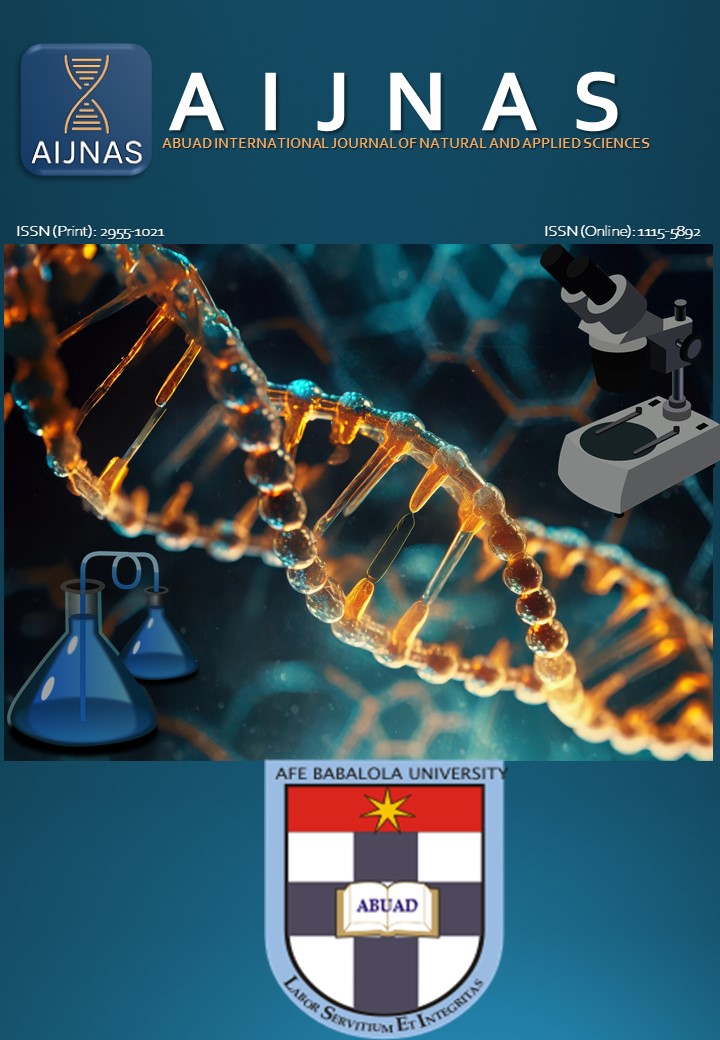Effect of aqueous extract of Mondia whitei fruits on high sucrose-induced oxidative stress in Drosophila melanogaster
Main Article Content
Abstract
Background/Aim: High sugar intake plays an important role in oxidative stress, which has been linked to development of diseases like diabetes. In this study, the effect of aqueous extract of Mondia whitei (AEMW) fruits on high sucrose-induced oxidative stress in Drosophila melanogaster was investigated. Materials and Methods: Adult flies (1 – 3 days old) were exposed to graded doses of AEMW for 12 days to determine the safe dose. Based on this, new flies were grouped into 5 (n = 5; 40 flies per vial). Group 1 served as control and were fed with basal diet, and group 2 with basal diet containing 30% sucrose. Groups 3 and 4, in addition to diet containing 30 % sucrose, were exposed to 0.25 and 0.5 mg AEMW/g diet, respectively, and group 5 flies were exposed to diet containing 0.5 mg AEMW/g diet only. Treatment lasted for 7 days. Biochemical assays such as glucose level, markers of antioxidant and oxidative stress were carried out to assess the effect of high sucrose and/or AEMW on flies. Results: Doses of AEMW up to 0.5 mg/g diet was safe for the flies. High sucrose diet significantly (p < 0.05) increased the level of glucose and oxidative stress markers, and reduced the levels of antioxidant parameters when compared to the control. These changes were prevented by the doses of AEMW. Conclusion: It can be concluded that AEMW possesses anti-hyperglycemic and antioxidant properties, and could be suggested to act against oxidative stress induced by high sucrose in fruit flies.
Downloads
Article Details

This work is licensed under a Creative Commons Attribution-NonCommercial-NoDerivatives 4.0 International License.
Authors hold the copyright of all published articles except otherwise stated.
References
Abolaji, A. O., Ajala, V. O., Adigun, J. O., Adedara, I. A., Kinyi, H. W., & Farombi, E. O. (2019). Protective role of resveratrol, a natural polyphenol, in sodium fluoride-induced toxicity in Drosophila melanogaster. Experimental Biology and Medicine, 244(18), 1688-1694.https://doi.org/10.1177/1535370219890334
Adepoju, O. T. (2009). Proximate composition and micronutrient potentials of three locally available wild fruits in Nigeria. African Journal of Agricultural Research, 4(9), 887-892.
Adesanoye, O. A., Farodoye, O. M., Adedara, A. O., Falobi, A. A., Abolaji, A. O., & Ojo, O. O. (2021). Beneficial actions of esculentin-2CHa(GA30) on high sucrose-induced oxidative stress in Drosophila melanogaster. Food and Chemical Toxicology, 157, 112620.
https://doi.org/10.1016/j.fct.2021.112620
Anadozie, S. O., Adewale, O. B., Akawa, O. B., Olayinka, J. N., Osukoya, O. A., Umanah, M. M., . . . Oludoro, O. S. (2023). Protective effect of aqueous fruit extract of Mondia whitei against cadmium-induced hepatotoxicity in rats. Journal of Herbmed Pharmacology, 12(1). https://doi.org/10.34172/jhp.2023.16
Anushree, Ali, M. Z., Bilgrami, A. L., & Ahsan, J. (2023). Acute Exposure to Arsenic Affects Pupal Development and Neurological Functions in Drosophila melanogaster. Toxics, 11(4). https://doi.org/10.3390/toxics11040327
Caturano, A., D'Angelo, M., Mormone, A., Russo, V., Mollica, M. P., Salvatore, T., . . . Sasso, F. C. (2023). Oxidative Stress in Type 2 Diabetes: Impacts from Pathogenesis to Lifestyle Modifications. Curr Issues Mol Biol, 45(8), 6651-6666. https://doi.org/10.3390/cimb45080420
Chaudhary, P., Janmeda, P., Docea, A. O., Yeskaliyeva, B., Abdull Razis, A. F., Modu, B., Sharifi-Rad, J. (2023). Oxidative stress, free radicals and antioxidants: potential crosstalk in the pathophysiology of human diseases. Frontiers in Chemistry, 11.
https://doi.org/10.3389/fchem.2023.1158198
Ellman, G. L. (1959). Tissue sulfhydryl groups. Arch Biochem Biophys, 82.
https://doi.org/10.1016/0003-9861(59)90090-6
Ellman, G. L., Courtney, K. D., Andres, V., & Featherstone, R. M. (1961). A new and rapid colorimetric determination of acetylcholinesterase activity. Biochemical Pharmacology, 7(2), 88-95. https://doi.org/10.1016/0006-2952(61)90145-9
Gédéon, B., Clément, I., Colette, M., Claudine, T., Emmanuel, L., Ruphin, D., . . . Koto-te-Nyiwa, N. (2017). Antisickling, Antioxidant and Antibacterial Activities of Afromomum alboviolaceum (Ridley) K. Schum, Annona senegalensis Pers. and Mondia whitei (Hook. f.) Skeels. American Journal of Laboratory Medicine, 2(4), 52-59. https://doi.org/10.11648/j.ajlm.20170204.13
Igharo, G., L.O, E., Godwin, A., Oshilonyah, H., Aikpitanyi, I., & Momodu, I. (2023). Resveratrol protects against copper and iron toxicity in Drosophila melanogaster. Universa Medicina, 42, 30-41. doi:10.18051/UnivMed.2023.v42:30-41
https://doi.org/10.18051/UnivMed.2023.v42.29-40
Lopez-Ortiz, C., Gracia-Rodriguez, C., Belcher, S., Flores-Iga, G., Das, A., Nimmakayala, P., . . . Reddy, U. K. (2023). Drosophila melanogaster as a Translational Model System to Explore the Impact of Phytochemicals on Human Health. International Journal of Molecular Sciences, 24(17), 13365. https://doi.org/10.3390/ijms241713365
Lowry, O. H., Rosebrough, N. J., Farr, A. L., & Randall, R. J. (1951). Protein measurement with the Folin phenol reagent. The Journal of Biological Chemistry, 193(1), 265-275.
https://doi.org/10.1016/S0021-9258(19)52451-6
Musselman, L. P., & Kühnlein, R. P. (2018). Drosophila as a model to study obesity and metabolic disease. Journal of Experimental Biology, 221(Suppl_1), jeb163881.
https://doi.org/10.1242/jeb.163881
Oketch-Rabah, H. A. (2012). Mondia whitei, a medicinal plant from Africa with aphrodisiac and antidepressant properties: a review. J Diet Suppl, 9(4), 272-284.
https://doi.org/10.3109/19390211.2012.726704
Oyaluna, Z., Abolaji, A., & Babalola, C. (2021). Effects of Ruzu Herbal Bitters, a Traditional Nigerian Polyherbal Drug, on Longevity and Selected Toxicological Indices in Drosophila melanogaster. Biointerface Research in Applied Chemistry, 11.
https://doi.org/10.33263/BRIAC112.96389645
Oyeniran, O. H., Oboh, G., Ademiluyi, A. O., & Umar, H. I. (2022). Mistletoe infested Moringa oleifera and Terminalia catappa leaves supplemented diet enhances antioxidant and insulin-like peptide mRNA levels in Drosophila melanogaster. Food Chemistry: Molecular Sciences, 5, 100124. https://doi.org/10.1016/j.fochms.2022.100124
Pitocco, D., Tesauro, M., Alessandro, R., Ghirlanda, G., & Cardillo, C. (2013). Oxidative Stress in Diabetes: Implications for Vascular and Other Complications. International Journal of Molecular Sciences, 14(11), 21525-21550. https://doi.org/10.3390/ijms141121525
Pizzino, G., Irrera, N., Cucinotta, M., Pallio, G., Mannino, F., Arcoraci, V., . . . Bitto, A. (2017). Oxidative Stress: Harms and Benefits for Human Health. Oxid Med Cell Longev, 2017, 8416763. https://doi.org/10.1155/2017/8416763
Strilbytska, O., Strutynska, T., Semaniuk, U., Burdyliyk, N., Bubalo, V., & Lushchak, O. (2022). Dietary Sucrose Determines Stress Resistance, Oxidative Damages, and Antioxidant Defense System in Drosophila. Scientifica (Cairo), 2022, 7262342.
https://doi.org/10.1155/2022/7262342
Varshney, R., & Kale, R. K. (1990). Effects of calmodulin antagonists on radiation-induced lipid peroxidation in microsomes. International Journal of Radiation Biology, 58(5), 733-743. https://doi.org/10.1080/09553009014552121




